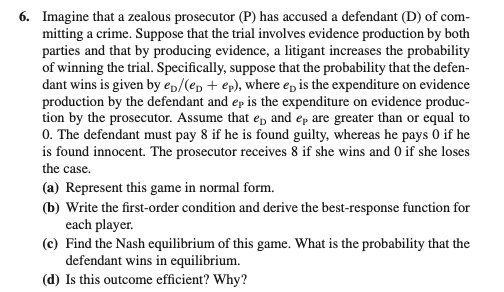mitting a crime. Suppose that the trial involves evidence production by both parties and that by producing evidence, a litigant increases the probability of winning the trial. Specifically, suppose that the probability that the defen- dant wins is given by ep/(ep + ep), where e, is the expenditure on evidence production by the defendant and ep is the expenditure on evidence produc- tion by the prosecutor. Assume that ep and ep are greater than or equal to 0. The defendant must pay 8 if he is found guilty, whereas he pays 0 if he is found innocent. The prosecutor receives 8 if she wins and O if she loses the case. (a) Represent this game in normal form. (b) Write the first-order condition and derive the best-response function for each player. (c) Find the Nash equilibrium of this game. What is the probability that the defendant wins in equilibrium. (d) Is this outcome efficient? Why?
mitting a crime. Suppose that the trial involves evidence production by both parties and that by producing evidence, a litigant increases the probability of winning the trial. Specifically, suppose that the probability that the defen- dant wins is given by ep/(ep + ep), where e, is the expenditure on evidence production by the defendant and ep is the expenditure on evidence produc- tion by the prosecutor. Assume that ep and ep are greater than or equal to 0. The defendant must pay 8 if he is found guilty, whereas he pays 0 if he is found innocent. The prosecutor receives 8 if she wins and O if she loses the case. (a) Represent this game in normal form. (b) Write the first-order condition and derive the best-response function for each player. (c) Find the Nash equilibrium of this game. What is the probability that the defendant wins in equilibrium. (d) Is this outcome efficient? Why?
Chapter7: Uncertainty
Section: Chapter Questions
Problem 7.7P
Related questions
Question
!

Transcribed Image Text:6. Imagine that a zealous prosecutor (P) has accused a defendant (D) of com-
mitting a crime. Suppose that the trial involves evidence production by both
parties and that by producing evidence, a litigant increases the probability
of winning the trial. Specifically, suppose that the probability that the defen-
dant wins is given by ep/(ep + ep), where ep is the expenditure on evidence
production by the defendant and ep is the expenditure on evidence produc-
tion by the prosecutor. Assume that ep and ep are greater than or equal to
0. The defendant must pay 8 if he is found guilty, whereas he pays 0 if he
is found innocent. The prosecutor receives 8 if she wins and 0 if she loses
the case.
(a) Represent this game in normal form.
(b) Write the first-order condition and derive the best-response function for
each player.
(c) Find the Nash equilibrium of this game. What is the probability that the
defendant wins in equilibrium.
(d) Is this outcome efficient? Why?
Expert Solution
This question has been solved!
Explore an expertly crafted, step-by-step solution for a thorough understanding of key concepts.
This is a popular solution!
Trending now
This is a popular solution!
Step by step
Solved in 2 steps with 3 images

Recommended textbooks for you

